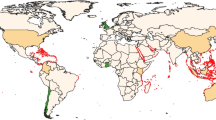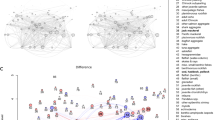Abstract
Understanding the feedbacks between food systems and conservation policies can help avoid unintended environmental consequences. Using a survey-based choice experiment and economic modelling, we quantify the potential impact of tourists’ responses to a shift in offshore fish supply after the designation of a large-scale marine protected area in Palau. We find that this conservation policy may increase offshore fish prices and tourists’ consumption of reef fish, thereby further endangering local reef ecosystems. However, if tourists are offered a sustainable offshore choice, their demand for fish could be kept at current levels, and environmental impacts from increased reef fish consumption would be avoided.
This is a preview of subscription content, access via your institution
Access options
Access Nature and 54 other Nature Portfolio journals
Get Nature+, our best-value online-access subscription
$29.99 / 30 days
cancel any time
Subscribe to this journal
Receive 12 digital issues and online access to articles
$119.00 per year
only $9.92 per issue
Buy this article
- Purchase on Springer Link
- Instant access to full article PDF
Prices may be subject to local taxes which are calculated during checkout


Similar content being viewed by others
Data availability
The authors declare that all of the data supporting the findings of this study are available within the paper and its Supplementary Information and Supplementary Data files.
Code availability
The custom code generated for this study is available in the Supplementary Data file.
References
Polasky, S. Planning with feedback effects. Proc. Natl Acad. Sci. USA 103, 5245–5246 (2006).
Ban, N. C. et al. Well-being outcomes of marine protected areas. Nat. Sustain. 2, 524–532 (2019).
Canavire-Bacarreza, G., Diaz-Gutierrez, J. E. & Hanauer, M. M. Unintended consequences of conservation: estimating the impact of protected areas on violence in Colombia. J. Environ. Econ. Manage. 89, 46–70 (2018).
Grafton, R. Q. et al. The paradox of irrigation efficiency. Science 361, 748–750 (2018).
Glamann, J., Hanspach, J., Abson, D. J., Collier, N. & Fischer, J.The intersection of food security and biodiversity conservation: a review. Reg. Environ. Change 17, 1303–1313 (2017).
Garnett, T. et al. Sustainable intensification in agriculture: premises and policies. Science 341, 33–34 (2013).
Balmford, A., Gravestock, P., Hockley, N., McClean, C. J. & Roberts, C. M. The worldwide costs of marine protected areas. Proc. Natl Acad. Sci. USA 101, 9694–9697 (2004).
Ngoc, Q. T. K. Impacts on the ecosystem and human well-being of the marine protected area in Cu Lao Cham, Vietnam. Mar. Policy 90, 174–183 (2018).
Brashares, J. S. et al. Bushmeat hunting, wildlife declines, and fish supply in West Africa. Science 306, 1180–1183 (2004).
Rentsch, D. & Damon, A. Prices, poaching, and protein alternatives: an analysis of bushmeat consumption around Serengeti National Park, Tanzania. Ecol. Econ. 91, 1–9 (2013).
Inogwabini, B. I. Bushmeat, over-fishing and covariates explaining fish abundance declines in the Central Congo Basin. Environ. Biol. Fishes 97, 787–796 (2014).
Degarege, G. A. & Lovelock, B. Sustainable tourism development and food security in Ethiopia: policy-making and planning. Tour. Plan. Dev. 16, 142–160 (2019).
Wood, L. J., Fish, L., Laughren, J. & Pauly, D. Assessing progress towards global marine protection targets: shortfalls in information and action. Oryx 42, 340–351 (2008).
Toonen, R. J. et al. One size does not fit all: the emerging frontier in large-scale marine conservation. Mar. Pollut. Bull. 77, 7–10 (2013).
Smyth, C. & Hanich, Q. Large Scale Marine Protected Areas: Current Status and Consideration of Socio-Economic Dimensions (Pew Charitable Trusts, 2019).
Gray, N. J. et al. Human dimensions of large-scale marine protected areas: advancing research and practice. Coast. Manag. 45, 407–415 (2017).
Lester, S. et al. Biological effects within no-take marine reserves: a global synthesis. Mar. Ecol. Prog. Ser. 384, 33–46 (2009).
Gruby, R. L. et al. Policy interactions in large-scale marine protected areas. Conserv. Lett. 2020, e12753 (2020).
Friedlander, A. M. et al. Size, age, and habitat determine effectiveness of Palau’s marine protected areas. PLoS ONE 12, e0174787 (2017).
Golbuu, Y. & Friedlander, A. M. Spatial and temporal characteristics of grouper spawning aggregations in marine protected areas in Palau, western Micronesia. Estuar. Coast. Shelf Sci. 92, 223–231 (2011).
Dacks, R., Lewis, S. A., James, P., Marino, L. L. & Oleson, K. Documenting baseline value chains of Palau’s nearshore and offshore fisheries prior to implementing a large-scale marine protected area. Mar. Policy 117, 103754 (2020).
Carreon, B. Palau’s marine sanctuary backfires, leading to increased consumption of reef fish. The Guardian (26 February 2020).
Birkeland, C. Working with, not against, coral-reef fisheries. Coral Reefs 36, 1–11 (2017).
Wabnitz, C. C. C., Cisneros-Montemayor, A. M., Hanich, Q. & Ota, Y. Ecotourism, climate change and reef fish consumption in Palau: benefits, trade-offs and adaptation strategies. Mar. Policy 88, 323–332 (2018).
Kemmerly, J. D. & Macfarlane, V. The elements of a consumer-based initiative in contributing to positive environmental change: Monterey Bay Aquarium’s seafood watch program. Zoo Biol. 28, 398–411 (2009).
Palau Responsible Tourism Policy Framework: 2017–2021 (Bureau of Tourism, 2016).
Brooks, M. E. et al. glmmTMB balances speed and flexibility among packages for zero-inflated generalized linear mixed modeling. R J. 9, 378–400 (2017).
Bradburn, N. M., Rips, L. J. & Shevell, S. K. Answering autobiographical questions: the impact of memory and inference on surveys. Science 236, 157–161 (1987).
Johnston, R. J. et al. Contemporary guidance for stated preference studies. J. Assoc. Environ. Resour. Econ. 4, 319–405 (2017).
McFadden, D. in Frontiers in Econometrics (ed. Zarembka, P.) 105–142 (Academic Press, 1973).
Krinsky, I. & Robb, A. On approximating the statistical properties of elasticities. Rev. Econ. Stat. 86, 715–719 (1986).
Loomis, J. What’s to know about hypothetical bias in stated preference valuation studies? J. Econ. Surv. 25, 363–370 (2011).
Hudson, D., Gallardo, R. K. & Hanson, T. R. A comparison of choice experiments and actual grocery store behavior: an empirical application to seafood products. J. Agric. Appl. Econ. 44, 49–62 (2012).
Beck, M. J., Fifer, S. & Rose, J. M. Can you ever be certain? Reducing hypothetical bias in stated choice experiments via respondent reported choice certainty. Transp. Res. B Methodol. 89, 149–167 (2016).
Acknowledgements
We thank National Geographic Pristine Seas for funding this project; the Palau International Coral Reef Center for coordinating and supporting the data collection; the survey enumerators, including A. Uchel and T. Holm; and T. Oliver for providing advice on our statistical analysis.
Author information
Authors and Affiliations
Contributions
S.A.L., K.L.L.O. and R.D. planned the project. S.A.L., K.L.L.O., R.D., C.F., S.F and P.A.S.J. designed the study. S.A.L. K.L.L.O., R.D. and L.M. collected the surveys. C.F., S.A.L., K.L.L.O., R.D. and S.F. conducted the analysis. C.F. and S.F. designed and estimated the choice experiment analysis. S.A.L., C.F. and K.L.L.O. wrote the paper. R.D., S.F., P.A.S.J., L.M. and Y.G. contributed to the writing.
Corresponding author
Ethics declarations
Competing interests
The authors declare no competing interests.
Additional information
Peer review information Nature Food thanks Mark Zimring and Hollie Booth for their contribution to the peer review of this work.
Publisher’s note Springer Nature remains neutral with regard to jurisdictional claims in published maps and institutional affiliations.
Supplementary information
Supplementary Information
Survey instrument, Supplementary Figs. 1–5 and Supplementary Tables 1–12.
Supplementary Data
Data and code for the choice experiment calculations, WTP modelling, demographics analysis and consumption calculations.
Rights and permissions
About this article
Cite this article
Lewis, S.A., Fezzi, C., Dacks, R. et al. Conservation policies informed by food system feedbacks can avoid unintended consequences. Nat Food 1, 783–786 (2020). https://doi.org/10.1038/s43016-020-00192-7
Received:
Accepted:
Published:
Issue Date:
DOI: https://doi.org/10.1038/s43016-020-00192-7



